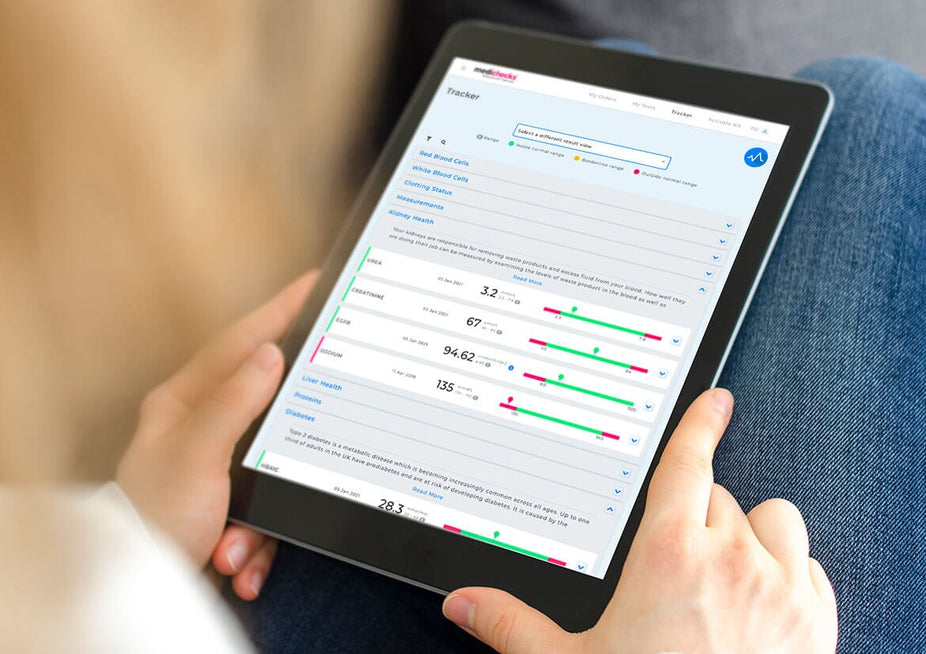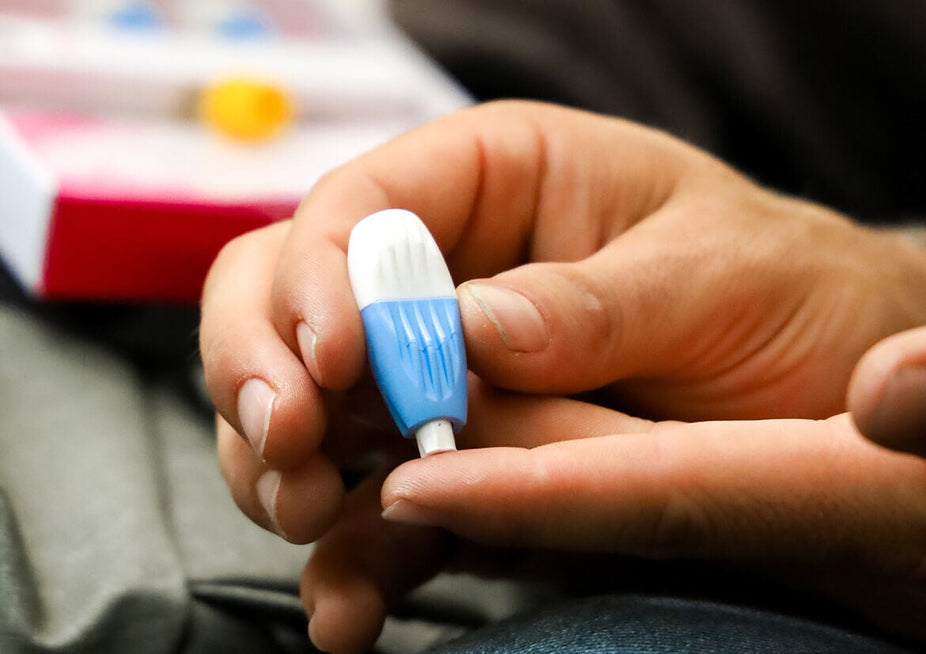Understanding your blood test results
Understand how doctors interpret your blood test results and what can influence your results.
Blood tests can help whether you want to monitor a condition, check your risk of something, or optimise your health and fitness.
So, what happens after your sample has been collected and sent off to the laboratory? We look at how doctors interpret your blood test results, how they are reported, and what can influence your results.
- How are blood results reported?
- How are laboratory ranges set?
- Can I compare results between different laboratories?
- Should I worry if my results are out of range?
- What can influence my blood test results?
- What should I do if I get an unexpected result?
How are blood results reported?
Blood tests results are given either as a scale of where they fall within a normal range (vitamins, minerals, or hormones) or whether something has been detected or not (e.g. a virus).
Laboratories usually report results electronically. The report is likely to include:
- Biomarker names (or codes)
- Date of measurements
- Reference ranges
- Units used
- Any notes from the laboratory staff
At Medichecks, we analyse this data and upload the results to your online account. This allows you to see where your results sit within the normal range.
Some GPs may not have the time to take you through your test results, and you may not be told any values, only whether they are normal or abnormal. However, if you are interested in knowing more, you have the right to ask your GP for a copy of your results.
The NHS app may also let you view your GP test results if your practice has enabled this feature, however, you may not be able to see your exact test results.
Each laboratory sets its ranges either by itself or by the manufacturer of the test [1]. This is the case whether you have a private or NHS blood test, which is why ranges can differ between laboratories.
How are laboratory ranges set?
The normal range for any given population is usually the range within which 95% of that population falls. This means 2.5% of that population will be above the normal range, and 2.5% will be below. At the edges of the normal range, there are areas of overlap where healthy individuals might have results outside the normal range, and unwell individuals could have them inside the normal range [2].
Can I compare results between different laboratories?
Laboratories use different analysers, which may have different reference ranges [3]. So, one result can look different from another. If you wish to compare results between different laboratories, it is best not to compare results directly. Instead, look at where your results lie within each laboratory’s given reference range.
What can influence your test results:
- The time of day your sample was taken
- Whether you have eaten
- How hydrated you are
- Whether you are taking supplements or medication
Some of my blood test results are outside the reference range – should I be worried?
A borderline or outside the normal reference range result is not always a cause for concern.
Blood test results can be abnormal for many reasons. If you eat before fasting cholesterol or glucose test, it is likely to cause a falsely elevated result. Taking certain medications might also skew your results. Some abnormal results are more concerning than others. A low vitamin D level is common and easily treatable, whereas elevated potassium can be very dangerous.
Our qualified doctors interpret your results and direct you to your GP if needed. Most blood tests need to be looked at in the context of other results, your symptoms, and your lifestyle. In some cases, you may need to repeat a blood test.
What can influence my blood test results?
Many factors can affect the blood test result. Laboratories are aware of these factors and have a great deal of experience dealing with many of these interferences.
Some can be planned for, like whether you fast before collecting your sample. While others may only become apparent when investigating an unexplained result.
Before you take your blood test, you will be told whether there are any special instructions (such as fasting) that you should follow.
What can affect my result?
We are aware that there are factors that can affect blood test results, but what do they include?
1. Fasting
Some tests can be influenced if you have just eaten [4]. Certain tests for diabetes, like insulin and glucose, will be affected by a recent meal.
If a test requires you to fast, you will be told, or it will state in the instructions. You will usually be asked to fast for eight hours or overnight.
2. Hydration
Hydration is key in the working of vital organs. Your level of hydration can affect certain markers when testing, including:
- Kidney health
- Red blood cells
- Liver markers
Keep yourself well hydrated (unless stated in the instructions not to) for the best chance of reliable results [5].
3. Exercise
Strenuous exercise can cause certain liver and muscle enzymes to be released into your bloodstream [6] and testosterone levels to be temporarily high or low.
If you want a true picture of your liver and hormone health, it is best to wait a few days after exercise to take a blood test.
4. Supplements
Taking vitamin or mineral supplements will almost always cause your blood levels of that vitamin or mineral to rise unless you have a problem absorbing nutrients in food (such as coeliac disease).
Biotin (vitamin B7) is known to interfere with some laboratory tests [7] (including tests for thyroid-related conditions) as it is used in the testing process itself. If your test is affected by biotin, you will be advised to stop taking it before your test.
5. Medications
Numerous drugs and medications can influence your blood test results.
It is always best to let your doctor or testing company know what medications (prescribed or otherwise) you are taking so that they can put any unusual results into context.
6. Age
Your age can influence things like your hormone levels, and the laboratory will have different reference ranges for some tests according to the age range you fall into.
For women, knowing where you are in your menstrual cycle or whether you are post-menopausal may also affect your reference ranges for hormone levels.
7. Time of day
Some hormones are very dependent on the time of day – both cortisol and testosterone levels are highest in the morning and will decline over the rest of the day.
It is recommended for both these tests to be taken when waking, usually, around 8 am-9 am.
8. Diet
Some tests require you to have eaten specific foods to be able to give you an accurate result.
This is particularly true of tests for coeliac disease, which are looking for an immune response to gluten – for the test to work properly, you need to have eaten gluten for at least six weeks prior [8].
9. Illness
Being ill or having just been ill can affect your blood test results.
Taking a blood test while you’re unwell might show:
- Temporarily raised or lowered white blood cells
- Elevated inflammatory or liver markers
- Abnormal thyroid hormone levels (as your body adjusts your metabolism to help you conserve energy and recover)
It is best to wait a few weeks (six weeks for a thyroid test) after any acute illness before having a blood test.
10. Hormone gels
Hormone gels can be absorbed into the skin as you apply the gel. If you are taking a hormone test with a finger-prick sample, it is common to see elevated results if you take the sample from the same finger you use to apply the gel (or hormone pessary). This is because the sample can become contaminated with the hormones absorbed in your finger.
What should I do if I get an unexpected result?
If a result looks unusual, your GP will discuss this with you. They may wish to repeat the test — sometimes, other factors may lead to a falsely abnormal result. They may also perform a physical examination or order additional tests.
If your Medichecks blood test result is abnormal, our team of expert doctors will pick up on this and advise you on what to do next.
For help choosing a blood test, read our top six blood tests to buy, or give our test finder a try.
References
- SelfDecode Labs. 2022. Normal Lab Values: Definition + What High/Low Values Mean - SelfDecode Labs. [online] Available at: <https://labs.selfdecode.com/blog/normal-lab-values/> [Accessed 16 February 2022].
- org.uk. 2022. Reference Ranges & What They Mean | Lab Tests Online-UK. [online] Available at: <https://labtestsonline.org.uk/articles/laboratory-test-reference-ranges> [Accessed 16 February 2022].
- publishing.service.gov.uk. 2022. UK Standards for Microbiology Investigations. [online] Available at: <https://assets.publishing.service.gov.uk/government/uploads/system/uploads/attachment_data/file/601969/Q_1i5.pdf> [Accessed 16 February 2022].
- uk. 2022. Can I eat and drink before having a blood test?. [online] Available at: <https://www.nhs.uk/common-health-questions/operations-tests-and-procedures/can-i-eat-and-drink-before-having-a-blood-test/> [Accessed 16 February 2022].
- 2022. Dehydration Affects Blood Pressure and Lab Blood Test Results. [online] Available at: <https://www.myonemedicalsource.com/2020/07/21/dehydration-blood-test/> [Accessed 16 February 2022].
- Pettersson, J., Hindorf, U., Persson, P., Bengtsson, T., Malmqvist, U., Werkström, V. and Ekelund, M., 2008. Muscular exercise can cause highly pathological liver function tests in healthy men. British Journal of Clinical Pharmacology, 65(2), pp.253-259.
- Sathyanarayana Rao TS, Christopher R, Andrade C. Biotin supplements and laboratory test results in neuropsychiatric practice and research. Indian J Psychiatry. 2017 Oct-Dec;59(4):405-406.
- Coeliac UK. 2022. Getting diagnosed - How to start your journey to a healthier life. [online] Available at: <https://www.coeliac.org.uk/information-and-support/coeliac-disease/getting-diagnosed/> [Accessed 16 February 2022].







